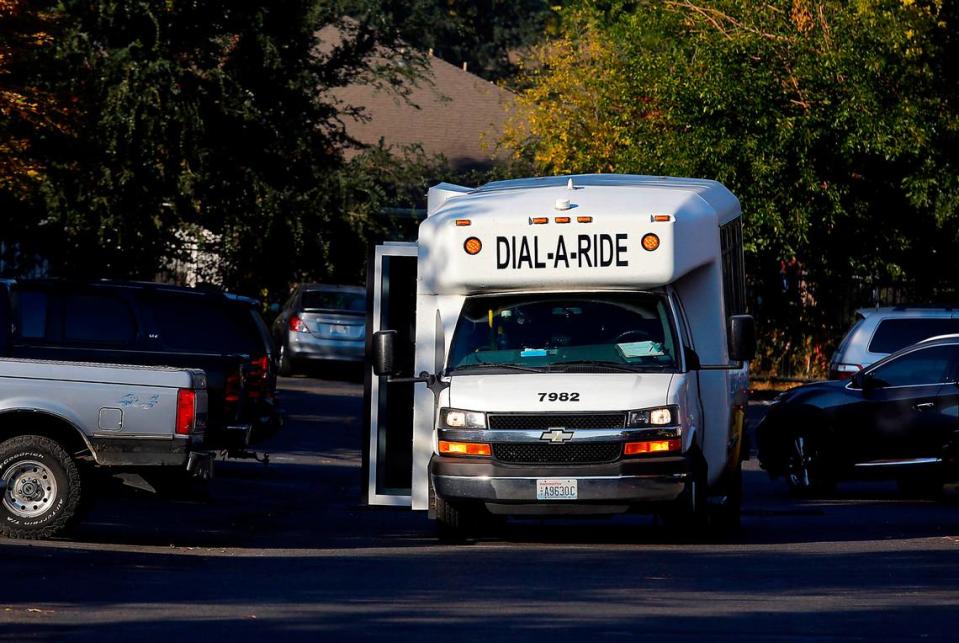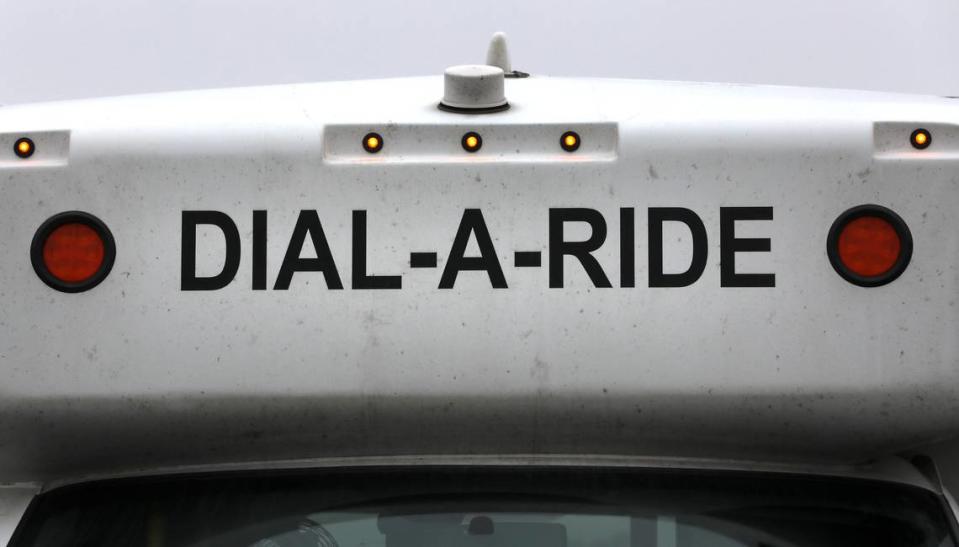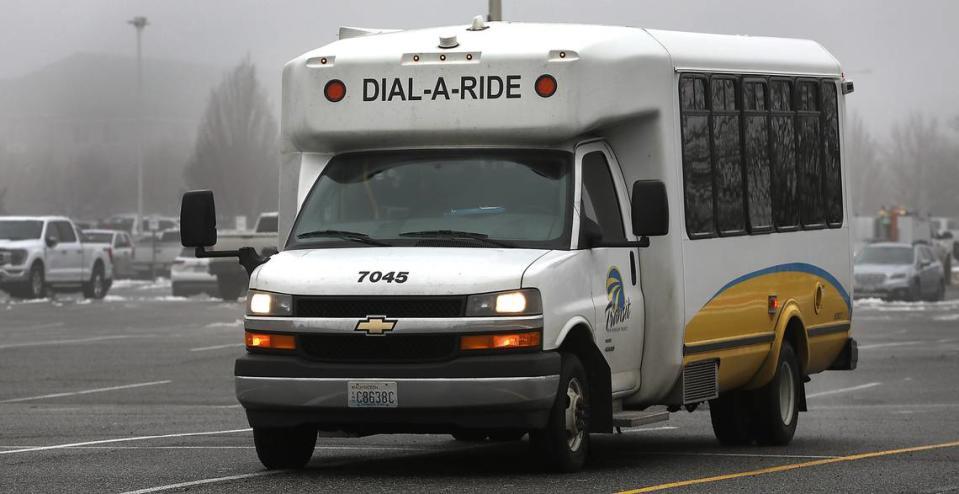Dial-A-Ride drivers cry foul over $3M outsourcing they say will make disabled less safe
A third of the calls for Dial-a-Ride services for riders with disabilities and limited service in outlying Tri-Cities areas will be contracted out to a private firm rather than filling open Ben Franklin Transit driver positions.
The transit agency says the move will improve efficiency, expand service and is a needed cost-cutting measure. It’s part of two job-cutting initiatives planned for this year that could eliminate as many as 30 positions.
But the recent vote by the public transit board drew immediate outrage from union employees, saying they fear the change puts the agency’s most medically fragile and youngest riders at risk.
Ben Franklin Transit Dial-A-Ride drivers see the decision as the start of a concerted effort by the board and management to get rid of employees in favor of inferior private contractors.
They’re claiming agency managers responded to months of paying mandatory overtime due to not hiring for open positions, by instead deciding to pay a contractor millions to take overflow calls that they’re not equipped or properly trained to handle.
Transit managers have said they have no choice but to make the changes after riders are being left waiting for hours because so many drivers are calling out sick or needing to take medical leave. Workers say it’s because they are being overworked.
The transit agency could not provide on-time rate information for Dial-A-Ride services.
The contractor, Via, operates BFT’s Connect service, which is a fleet of on-call minivans that riders can request service from using an app. It’s owned by a national private transit company named Nomad Transit.
The limited bus services to Prosser and Benton City were largely being used to get children to school, drivers said. Via also will help launch a service to provide shuttles to the Tri-Cities Airport. Details on the airport shuttle service are not yet available.
The transit board, made up of elected officials from the local cities and counties, is charged with stewarding the transit system’s $60 million budget.
It’s outsourcing decision drew immediate concerns from employees at the meeting, leaving the board’s chairman struggling to maintain order.

At one point, Chairman Will McKay, a Benton County commissioner, told one audience member to “zip it.”
He then asked if security could remove the person, saying it was “like talking to my little kids.”
Drivers pushing back
A BFT union rep later told the Herald that the Dial-A-Ride service’s on-time rates for picking up passengers has been dropping because the agency won’t hire enough new drivers.
He said that’s forced drivers to work weeks at a time without days off and often work several hours of overtime daily, causing burnout and injuries.
The transit board was told they will be able to eliminate 14 open Dial-A-Ride positions. And they have a plan to cut 15 to 20 more jobs in various departments that will be brought to the board later this summer.
Teamsters Local Union 839 Secretary Russell Shjerven said the BFT manager Rachelle Glazier is trying to privatize the public service instead of filling open positions.

Then Glazier is blaming the union and employees for problems, he claimed.
Glazier started at BFT in July 2022, as the board was considering whether to go to voters with a plan to cut the current tax that pays for the service. She previously served as Portland area TRI-MET’s Executive Director of Transportation Operations.
In a recent news release BFT said the move to outsource overflow Dial-a-Ride calls was an attempt to expand service and improve flexibility and efficiency in scheduling.
The contract changes could add up to $3 million more to Via’s current service and is good through Summer 2025.
It allows Via to take on up to 70 Dial-A-Ride ADA calls per day, as well as bus students in Kiona-Benton and Prosser school districts and provide new services to the airport.
Instead of riding in a Dial-A-Ride bus that seats about 20, multiple vans would be sent to pick up the rural riders and students. Glazier said the contractor currently only has two ADA accessible vehicles, but was looking into getting more vehicles that can accommodate wheelchair and powerchair users.
“This is a way to ensure we continue to deliver core service,” Glazier told the Herald.

Statistics released by BFT show demand was averaging about 35,000 Dial-A-Ride calls per month through 2019. The board was told the most recent data shows those calls are only back up to about 20,000 per month, and while the on-time rates are being impacted by staffing, they’re still maintaining 100% pickups.
The Herald has requested more data, but BFT said they were unable to accommodate a timely response to the request under the Washington Public Records Act due to a high volume or public record inquiries. The most recent rider data on their website is from late 2021.
She said the contract doesn’t mean 70 ADA rides per day will be assigned to Via, just that the company will step in to take on rides BFT drivers can’t get to on time.
Via’s priority will be riders who don’t need mobility assistance, allowing Dial-A-Ride drivers to handle more of the ADA calls.
She also said that the Benton City and Prosser services were general service, not just for school kids, but said more information about their training would be released at a later time.
“The best avenue right now, is we need the employees to provide the best service to the public and protect their work, that means show up and be available,” Glazier said.
Glazier declined to go into specifics about how the contract will impact future hiring practices.

Training and experience concerns
Shjerven said there is real concern among drivers about children as young as kindergartners sharing vans with strangers or drivers who might not have undergone the same rigorous training as BFT employees.
A driver who has used Connect to get to work told board members that they saw a wide range of safety concerns with Via drivers ranging from phone use while driving to bringing personal pets along.
The BFT employee giving the presentation confirmed these complaints had been received, but said Via addressed them immediately.
One audience member at the meeting asked the board to think about whether they’d consider it safe enough to allow their own children to use the service once the changes are implemented.
Glazier assured board members Via would have the same level of accountability as BFT employees, but said they could not discuss training, background check processes or accountability measures such as in-vehicle cameras, this early in the process.
It’s unclear how long it will take Via to start the new service, but further negotiations about details could not begin until after the contract changes were approved.
Shjerven said Via doesn’t have the capacity to help with those overflow ADA calls and doesn’t have the correct vehicles or training to provide Dial-A-Ride services.
Risks of falls, a doctor’s recommendation or being a wheelchair or mobility device user are not automatic qualifiers, according to the application.
The union has filed a “demand to bargain” letter relating to the questions and concerns Shjerven and the drivers have raised.
Eliminating positions
Glazier told the board the transit system would see additional savings because they planned to close the currently open positions for Dial-A-Ride drivers. She did not explain whether replacement drivers would be hired if someone quit or retired in the next year and a half.
Glazier told the Herald they’re not filling currently open positions because Dial-A-Ride calls are still below pre-pandemic demand. Glazier believes they have adequate staffing for current demand if drivers are not out sick or on leave.
Shjerven said drivers see this as the beginning of a process to phase them out. He said that could take years to do because they have plenty of younger drivers, but they believe that is the board and management’s intent.
“Say I have three Dial-A-Ride drivers retire this year? Is she going to replace them with Via drivers?” Shjerven said. “It might take 10 years ... but it just looks like she’s trying to privatize Dial-A-Ride.”
Shjerven said that because of the nature of service Dial-A-Ride drivers perform, they are at higher risk of injury or illness when helping people in and out of buses and taking them to medical appointments.

The BFT board has not said if this move is intended to be a permanent solution to overflow calls or the beginning of a transition to privatizing portions of the service, but individual board members have been pressing for savings and cost reductions.
The agency said in a news release that the next step in the process is working with their citizen advisory network to ensure Via can meet expectations.
“These shared services will ensure we’re well equipped to support our Dial-A-Ride customers in the event of an increase in ridership and will provide consistency for our cherished clientele. We want to position ourselves to offer the most dependable service to our community,” Glazier said in the news release. “Get used to seeing our BFT CONNECT Via vans in more locations, including Prosser and Benton City, as we strive for service excellence.”
The salary range for a Dial-A-Ride driver is $26.91 an hour after training and up to $31.40 hourly with five years of service, according to their most recent collective bargaining agreement.
It’s unclear how much their health and retirement benefits add to salaries, but Glazier told the board certain retirement plans were unsustainable.
She told the board that they will also be coming back with an open headcount reduction plan by summer, estimating they would be able to close out 15 to 20 positions currently open.
“So to be clear I’m not saying all these reductions will be coming from Dial-A-Ride” she said “This will be a compliment around the agency .... to reduce costs, so that we can continue to run Ben Franklin Transit five years from now without a budget deficit or having to ask tax payers for more money.”
Glazier and the board members received pushback from audience members during the meeting, leading to chairman Will McKay, a Benton County commissioner, calling for order.
After the board voted unanimously to adjust the contract, audience members began yelling, resulting in McKay trying to regain control of the meeting, but being met with argument from audience members.
The audience member argued they were speaking up because the board was attempting to censor employees and the public by changing its comment policy to bar public comments unless directly related to items on the agenda.
It’s unclear from a video recording of the meeting whether security removed the person from the meeting, but the meeting continued after that.

